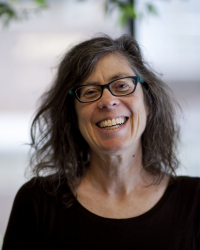You are here
Alison-Crowe

I am a member of the Biology Education Research Group (BERG) at University of Washington and am currently working on two different discipline-based education research projects:
The goals of the first project are to 1) establish the key concepts we want biology majors to understand when they graduate and 2) design a multiple true-false assessment which can measure student progress toward these concepts. Five core "big ideas in biology" were outlined in the NSF-AAAS report, Vision and Change: Evolution, Transformation of Energy and Matter, Information Flow, Structure and Function, and Interacting Systems. We have used these ideas as a starting point to develop a framework of key concepts which span the different areas of biology, from molecules to ecosystems. National validation of this framework led to publication of the BioCore Guide (Brownell et al. 2014). To measure student understanding of these core concepts, we have taken part in a multi-institution collaborative grant with Arizona State University, University of Colorado, University of Maine and University of Nebraska to develop a suite of assessments called Biology-Measuring Achievement and Progression in Science (Bio-MAPS). At the University of Washington, we have focused our efforts on developing and validating GenBio-MAPS, desgined to assess the effectiveness of a general biology curriculum at teaching the five core concepts outlined by Vision and Change. We have piloted GenBio-MAPS at over 20 institutions nationally and are currently validating the assessment prior to broad dissemination. This project was funded through a NSF collaborative grant.
The second project, led by Alexa Clemmons, a postdoctoral researcher at the University of Washington, is aimed at developing tools that can be used to support self-directed reform of core competencies teaching by biology educators, both individually and at the department-level. Specifically we will 1) develop a nationaly validated set of learning outcomes for the 6 core competencies outlined by Vision and Change (BioSkills Guide) and 2) develop and pilot a programmatic survey of BioSkills coverage. At the individual course level, instructors planning new courses or revising existing ones will be able to use the BioSkills Guide to define specific competency learning outcomes and locate appropriate assessments and instructional tools. At the program level, departments engaged in routine curricular review or wide-scale curricular reform will be able to use the programmatic survey to self-assess how thoroughly they are teaching the core competencies throughout the department. We are currently gathering feedback from the biology community on an initial draft of the BioSkills Guide and will iteratively revise the draft prior to national-level validation. This project is funded through a NSF IUSE grant.
Our group also has a general interest in understanding what makes active learning approaches more effective than traditional lecturing. One of our completed projects focused on developing and comparing the relative effectiveness of alternative Active Learning Modules (ALMs) in teaching three core concepts in introductory cell biology: eukaryotic gene regulation, protein translation and regulation of cell cycle. We focused on these three fundamental concepts as they are central to understanding how cells function and are nearly universally taught as part of the college-level introductory cell biology curriculum. Due to their complexity, they also pose significant teaching challenges. We have developed worksheets for each of these 3 topics in both "jigsaw" and "single group" formats designed to be completed in a 50 minute class period. 8-question multiple choice format assessments were also designed to measure student learning of the central concepts introduced in each worksheet. Worksheets and assessments are available on request. This project was funded by a NSF Transforming Undergraduate Education in the Sciences grant.
In addition to biology education research, I also continue to pursue my interest in the role that epigenetic mechanisms such as chromatin modification, play in environmental adaptation of plants. This research is carried out by undergraduate cell and molecular biology students in a laboratory course which I developed and teach called "Experiments in Molecular Biology". The predominantly sessile nature of plants necessitates an ability to adapt to rapidly changing environmental conditions. The remarkable developmental plasticity that plants exhibit strongly suggest the existence of chromatin-mediated mechanisms for altering established gene expression programs. We have chosen Arabidopsis as a model system to study the role of epigenetic mechanisms in adaptation due to the public availability of transgenic lines harboring targeted disruptions of individual chromatin regulatory genes. Students develop hypotheses and design experiments to examine the relative abilities of Arabidopsis histone acetyl transferase mutants to adapt to artificially-induced abiotic stresses including high salinity and cold temperatures.
Alison Crowe received a B.A. in Biology and French Literature from UC Santa Barbara in 1987. She was awarded her Ph.D. from the Microbiology Department at State University of New York at Stony Brook in 1993. She completed 2 postdoctoral fellowships, the first in the Department of Biology at University of Calgary studying seed gene regulation and the second focused on chromatin regulation of gene expression at the University of Cincinnati in the Department of Molecular Genetics, Biochemistry and Microbiology. She joined the Department of Zoology at the University of Washington in 2000 and was promoted to Principal Lecturer in the Department of Biology in 2006. Alison Crowe received a B.A. in Biology and French Literature from UC Santa Barbara in 1987. She was awarded her Ph.D. from the Microbiology Department at State University of New York at Stony Brook in 1993. She completed 2 postdoctoral fellowships, the first in the Department of Biology at University of Calgary studying seed gene regulation and the second focused on chromatin regulation of gene expression at the University of Cincinnati in the Department of Molecular Genetics, Biochemistry and Microbiology. She joined the Department of Zoology at the University of Washington in 2000 and was promoted to Principal Lecturer in the Department of Biology in 2006. Her research interests include developing evidence-based inclusive active learning strategies for teaching biology and creating validated tools to guide curricular reform at the departmental level.
